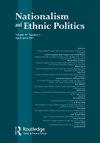希望还是不希望:自由主义、新自由主义,以及从黎巴嫩2022年选举中吸取教训
IF 0.7
Q3 ETHNIC STUDIES
引用次数: 0
摘要
本快速通信检查黎巴嫩的2022年议会选举在其他最近的选举在联合和民粹主义政权的背景下。黎巴嫩选民现在因宗派认同和支持与反对建制的分裂而分裂。这第二个分裂使黎巴嫩看起来更像其他选举专制政权。鉴于将选举威权主义与晚期新自由主义联系起来的学术工作,黎巴嫩最近的选举促使人们重新关注其和其他联合制度中嵌入的新自由主义假设。本文章由计算机程序翻译,如有差异,请以英文原文为准。
To Hope or Not to Hope: Liberalism, Neoliberalism, and Learning from Lebanon’s 2022 Election
Abstract This Rapid Communication examines Lebanon’s 2022 Parliamentary election in the context of other recent elections in consociational and populist regimes. The Lebanese electorate is now divided both by sectarian identity and by a pro- versus anti-establishment cleavage. This second cleavage makes Lebanon look more like other electoral authoritarian regimes. In light of scholarly work that ties electoral authoritarianism to late-stage neoliberalism, Lebanon’s recent election prompts renewed attention to the neoliberal assumptions embedded in its and other consociational systems.
求助全文
通过发布文献求助,成功后即可免费获取论文全文。
去求助
来源期刊

Nationalism and Ethnic Politics
ETHNIC STUDIES-
CiteScore
1.30
自引率
0.00%
发文量
30
期刊介绍:
Nationalism & Ethnic Politics explores the varied political aspects of nationalism and ethnicity in order to develop more constructive inter-group relations. The journal publishes case studies and comparative and theoretical analyses. It deals with pluralism, ethno-nationalism, irredentism, separatism, and related phenomena, and examines processes and theories of ethnic identity formation, mobilization, conflict and accommodation in the context of political development and "nation-building". The journal compares and contrasts state and community claims, and deal with such factors as citizenship, race, religion, economic development, immigration, language, and the international environment.
 求助内容:
求助内容: 应助结果提醒方式:
应助结果提醒方式:


